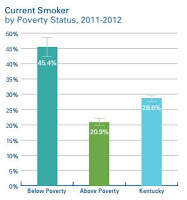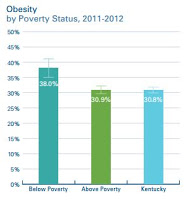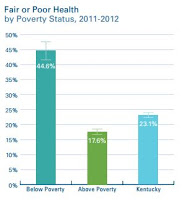Health News
- Ky. Shows Health Improvements In Kids Count Report, But Is Still Held Back By Poverty; 1/4 Of Children In State Live In Poverty
Overall Child Well-Being by State: 2015By Melissa Patrick Kentucky Health News Kentucky ranks 34th in the nation for overall child well-being, showing the most improvement in health and a significant decrease in teen births in recent years, according...
- Kentucky Poverty Rate Is Fifth Highest In U.s., But A Larger Share Of Kentuckians Had Health Insurance In 2012 Than In 2011
By Molly Burchett Kentucky Health News In 2012, as U.S. incomes remained lower and poverty rates higher than in 2007, the year before the recession, Kentucky poverty rates increased and one in four Kentucky children were living in poverty, according to...
- Kids Count Report Shows Where Children In Your County And School District Rank, In A Huge Number Of Measures
Conditions have improved slightly for Kentucky children, especially in education and health, and the state's overall well-being ranking has gone up one spot, from 35th to 34th in the nation. But economic conditions for young Kentuckians have...
- Fewer Families Report Having Trouble Paying Medical Bills; Near-poor Struggle More Than Poor Families
Fewer American families are having problems paying medical bills, but 20 percent of them, particularly those without insurance and those that are "near poor" but not :poor," still struggle with health costs, says a study released Tuesday by the National...
- Children's Health And Education Improves In Kentucky, But One In Four Kids Lives In Poverty, Report Shows
New data show one in four Kentucky children live in poverty, a sharp increase since 2005, but the state is improving when it comes to children's health and education. These were the latest findings in the influential Kids Count report by the Annie...
Health News
Improving Kentuckians' health will require education, fighting poverty; poor and less educated have poorer health, study shows
By Melissa Patrick
Kentucky Health News
Increased access to insurance is just one part of the equation to improve the health of Kentuckians, improving poverty and increasing education levels are disparities that must also be addressed if Kentucky ever hopes to improve the health of its citizens.
"We believe that health disparities can be eliminated, and that they must be eliminated," say the authors of a recently released report, Money Matters: Health Disparities in the Commonwealth - a Report on Socioeconomic status and health in Kentucky. "The first step towards eliminating health disparities is to understand and monitor where they exist."
The report was released by the Foundation for a Healthy Kentucky and the University of Kentucky College of Public Health.
Using 2011-12 data from the Kentucky Behavioral Risk Factor Surveillance System (the most recent data available), this report looked at the relationship between health, income and education and found that poverty and lower education levels are consistently associated with poorer health.
 The data show that people who live in poverty and those with less education are more likely to be smokers. Smoking is a known cause of cancer, heart disease, stroke and other chronic conditions.
The data show that people who live in poverty and those with less education are more likely to be smokers. Smoking is a known cause of cancer, heart disease, stroke and other chronic conditions.
In 2011-13, the smoking rate in Kentucky was 28.6 percent, with almost one in three adults smoking. Of this group, almost half of the smokers (45.4 percent) were below poverty, while 20.9 percent were above poverty; and more than four in 10 (44.6 percent) had less than a high school education and about one in 10 (11.9 percent) were college graduates.
Obesity, which contributes to heart disease, stroke, type 2 diabetes and cancer, was also found to be more prevalent among the poor and uneducated.
 The report found that 30.8 percent of Kentuckians were obese. Of this group, 38 percent lived below poverty and 30.9 percent lived above poverty; and 33.6 percent of those with less than a high school degree were obese, compared to 25.5 percent of college graduates.
The report found that 30.8 percent of Kentuckians were obese. Of this group, 38 percent lived below poverty and 30.9 percent lived above poverty; and 33.6 percent of those with less than a high school degree were obese, compared to 25.5 percent of college graduates.
Two-thirds of Kentuckians were considered overweight in the survey, and this was consistent across socioeconomic and education groups.
Poor, less educated Kentuckians in the survey also reported that they were less physically active and that they had increased activity limitations than those who lived above poverty and with more education.
 Another health indicator among poor, less educated Kentuckians was that they were more likely to describe their health as fair or poor. Of the 23.1 percent of Kentuckians who described their health as fair or poor, 44.6 percent were below poverty and 17.6 percent were above poverty; and 45.2 percent of them had less than a high school education, while 9.1 percent of them were college graduates.
Another health indicator among poor, less educated Kentuckians was that they were more likely to describe their health as fair or poor. Of the 23.1 percent of Kentuckians who described their health as fair or poor, 44.6 percent were below poverty and 17.6 percent were above poverty; and 45.2 percent of them had less than a high school education, while 9.1 percent of them were college graduates.
This finding was also true for people reporting poor physical health and poor mental health.
Of the 16.8 percent of Kentuckians who said they had poor physical health, 36.5 percent lived below poverty and 12.3 percent lived above poverty; and 30.8 percent had less than a high school education, while 7.4 percent were college graduates.
Of the 15.9 percent of Kentuckians who said they had poor mental health, 33.9 percent lived below poverty and 11.1 percent lived above poverty; and 28.2 percent had less than a high school degree, while 7.8 percent were college graduates.
Poorer, less educated people in Kentucky were also found to have increased levels of asthma and diabetes.
While the study also found that poorer Kentuckians have less access to health care, often forgo medical care due to the cost, and are less likely to have health insurance, it must be noted that this data was collected prior to the implementation of the Patient Protection and Affordable Care Act, which has since provided health coverage to more than 500,000 Kentuckians. The percentage of uninsured in Kentucky has dropped to 9 percent, compared to 20.4 percent in 2013, prior to the law's implementation.
That being said, "one-quarter of consumers who buy insurance on their own still have problems being able to afford needed care," according to a Families USA report.
"Simply having health insurance is no guarantee that consumers can afford to pay for health care," the report said. "Health insurance involves different types of costs that consumers must pay out of pocket?ranging from a health plan?s deductible to co-payments at a doctor?s office. These expenses add up, and research has shown that even nominal cost-sharing can deter people from getting needed care."
"Economic opportunity is the cornerstone of getting people jobs and employment. That then requires good education. Those two combined set the stage for people to pay more attention to their own health and the health of their community," Dr. William Hacker, former state health commissioner and current health chair of Shaping Our Appalachian Region, said at a recent advisory council meeting. SOAR is a bipartisan, nonprofit effort to improving the economy of Appalachian Kentucky.
The importance of getting families out of poverty was also noted by Dr. Terry Brooks, executive director of Kentucky Youth Advocates, in response to the 2014 Kids Count report, which ranked Kentucky 32nd in economic well-being.
"Here?s the bottom line from this year?s report: If we as a commonwealth want to get serious about improving the lives of our children, there is one overriding and persistent challenge: poverty," Brooks said. "You can?t talk education or health without talking family economics. And we can begin to tackle persistent poverty only when economic well-being policy stops being political and starts being about the common good."
Kentucky Health News
Increased access to insurance is just one part of the equation to improve the health of Kentuckians, improving poverty and increasing education levels are disparities that must also be addressed if Kentucky ever hopes to improve the health of its citizens.
"We believe that health disparities can be eliminated, and that they must be eliminated," say the authors of a recently released report, Money Matters: Health Disparities in the Commonwealth - a Report on Socioeconomic status and health in Kentucky. "The first step towards eliminating health disparities is to understand and monitor where they exist."
The report was released by the Foundation for a Healthy Kentucky and the University of Kentucky College of Public Health.
Using 2011-12 data from the Kentucky Behavioral Risk Factor Surveillance System (the most recent data available), this report looked at the relationship between health, income and education and found that poverty and lower education levels are consistently associated with poorer health.
In 2011-13, the smoking rate in Kentucky was 28.6 percent, with almost one in three adults smoking. Of this group, almost half of the smokers (45.4 percent) were below poverty, while 20.9 percent were above poverty; and more than four in 10 (44.6 percent) had less than a high school education and about one in 10 (11.9 percent) were college graduates.
Obesity, which contributes to heart disease, stroke, type 2 diabetes and cancer, was also found to be more prevalent among the poor and uneducated.
Two-thirds of Kentuckians were considered overweight in the survey, and this was consistent across socioeconomic and education groups.
Poor, less educated Kentuckians in the survey also reported that they were less physically active and that they had increased activity limitations than those who lived above poverty and with more education.
This finding was also true for people reporting poor physical health and poor mental health.
Of the 16.8 percent of Kentuckians who said they had poor physical health, 36.5 percent lived below poverty and 12.3 percent lived above poverty; and 30.8 percent had less than a high school education, while 7.4 percent were college graduates.
Of the 15.9 percent of Kentuckians who said they had poor mental health, 33.9 percent lived below poverty and 11.1 percent lived above poverty; and 28.2 percent had less than a high school degree, while 7.8 percent were college graduates.
Poorer, less educated people in Kentucky were also found to have increased levels of asthma and diabetes.
While the study also found that poorer Kentuckians have less access to health care, often forgo medical care due to the cost, and are less likely to have health insurance, it must be noted that this data was collected prior to the implementation of the Patient Protection and Affordable Care Act, which has since provided health coverage to more than 500,000 Kentuckians. The percentage of uninsured in Kentucky has dropped to 9 percent, compared to 20.4 percent in 2013, prior to the law's implementation.
That being said, "one-quarter of consumers who buy insurance on their own still have problems being able to afford needed care," according to a Families USA report.
"Simply having health insurance is no guarantee that consumers can afford to pay for health care," the report said. "Health insurance involves different types of costs that consumers must pay out of pocket?ranging from a health plan?s deductible to co-payments at a doctor?s office. These expenses add up, and research has shown that even nominal cost-sharing can deter people from getting needed care."
"Economic opportunity is the cornerstone of getting people jobs and employment. That then requires good education. Those two combined set the stage for people to pay more attention to their own health and the health of their community," Dr. William Hacker, former state health commissioner and current health chair of Shaping Our Appalachian Region, said at a recent advisory council meeting. SOAR is a bipartisan, nonprofit effort to improving the economy of Appalachian Kentucky.
The importance of getting families out of poverty was also noted by Dr. Terry Brooks, executive director of Kentucky Youth Advocates, in response to the 2014 Kids Count report, which ranked Kentucky 32nd in economic well-being.
"Here?s the bottom line from this year?s report: If we as a commonwealth want to get serious about improving the lives of our children, there is one overriding and persistent challenge: poverty," Brooks said. "You can?t talk education or health without talking family economics. And we can begin to tackle persistent poverty only when economic well-being policy stops being political and starts being about the common good."
- Ky. Shows Health Improvements In Kids Count Report, But Is Still Held Back By Poverty; 1/4 Of Children In State Live In Poverty
Overall Child Well-Being by State: 2015By Melissa Patrick Kentucky Health News Kentucky ranks 34th in the nation for overall child well-being, showing the most improvement in health and a significant decrease in teen births in recent years, according...
- Kentucky Poverty Rate Is Fifth Highest In U.s., But A Larger Share Of Kentuckians Had Health Insurance In 2012 Than In 2011
By Molly Burchett Kentucky Health News In 2012, as U.S. incomes remained lower and poverty rates higher than in 2007, the year before the recession, Kentucky poverty rates increased and one in four Kentucky children were living in poverty, according to...
- Kids Count Report Shows Where Children In Your County And School District Rank, In A Huge Number Of Measures
Conditions have improved slightly for Kentucky children, especially in education and health, and the state's overall well-being ranking has gone up one spot, from 35th to 34th in the nation. But economic conditions for young Kentuckians have...
- Fewer Families Report Having Trouble Paying Medical Bills; Near-poor Struggle More Than Poor Families
Fewer American families are having problems paying medical bills, but 20 percent of them, particularly those without insurance and those that are "near poor" but not :poor," still struggle with health costs, says a study released Tuesday by the National...
- Children's Health And Education Improves In Kentucky, But One In Four Kids Lives In Poverty, Report Shows
New data show one in four Kentucky children live in poverty, a sharp increase since 2005, but the state is improving when it comes to children's health and education. These were the latest findings in the influential Kids Count report by the Annie...
